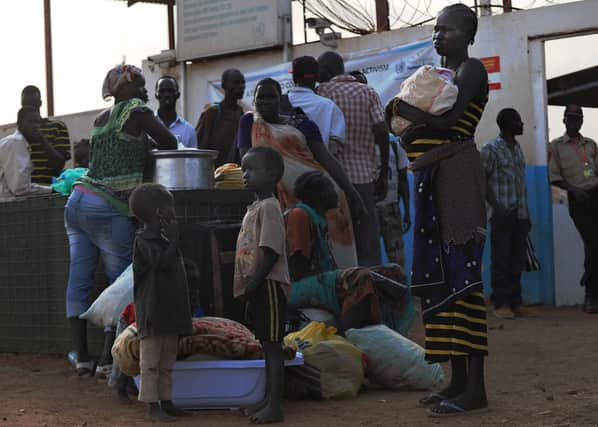South Sudan rebels take control of oil rich region


Bentiu, the capital of oil-rich Unity state, is now controlled by a military commander loyal to former vice-president Riek Machar, said Colonel Philip Aguer, the South Sudanese military spokesman.
The armed rebels were said to be in control days earlier of some of South Sudan’s oil fields, which have historically been a target for rebel movements, endangering the country’s economic lifeblood.
Advertisement
Hide AdAdvertisement
Hide AdSouth Sudan gets nearly 99 per cent of its government budget from oil revenues, and the country reportedly earned $1.3 billion (£796 million) in oil sales in just five months this year, according to the London-based watchdog group Global Witness.
Although the country’s capital, Juba, is mostly peaceful a week after a dispute among members of the presidential guard triggered violent clashes between military factions, fighting continues as the central government tries to assert authority in the states of Unity and Jonglei.
Bor, the capital of Jonglei, is said to be the scene of some of the fiercest clashes between government troops and rebels.
Michael Makuei Lueth, South Sudan’s information minister, said Mr Machar was believed to be hiding somewhere in Unity state. “He is a rebel, he’s a renegade and we are looking for him. He’s moving in the bushes of South Sudan,” Mr Lueth said.
The UN mission in South Sudan said in a statement yesterday that all non-critical staff in Juba are being evacuated to Uganda. The mission said the move was “a precautionary measure to reduce pressures on its limited resources” as it continues to provide assistance and shelter to more than 20,000 civilians gathered inside its compounds in Juba, the mission said in a statement yesterday.
Hilde Johnson, the UN secretary-general’s envoy in South Sudan, said the evacuation does not mean the UN is “abandoning” the country.
“We are here to stay, and will carry on in our collective resolve to work with and for the people of South Sudan,” she said.
Hundreds have been killed in the fighting and world leaders are concerned about civil war in a country with a history of ethnic violence and divided military loyalties.
Advertisement
Hide AdAdvertisement
Hide AdThe United States and other countries have been evacuating their citizens from South Sudan. The US embassy in Juba said it has evacuated at least 450 Americans and other foreign nationals from the city this week.
On Saturday gunfire hit three US military aircraft trying to evacuate American citizens in Bor, wounding four US service members. In the same region gunfire downed a UN helicopter on Friday.
Earlier this week the top military general in Bor defected with his troops, starting a rebellion that appears to be spreading.
Col Aguer said Bor is still under the control of pro-Machar forces, disputing reports the rebels had fled as government troops advanced on Bor.
South Sudan’s president Salva Kiir, an ethnic Dinka, said last week that an attempted military coup had triggered the violence, and the blame was placed on Mr Machar, an ethnic Nuer. But officials have since said a fight between Dinka and Nuer members of the presidential guard triggered the fighting that later spread across the East African country.
UN secretary-general Ban Ki-moon yesterday urged South Sudan’s leaders “to do everything in their power” to stop the violence.
Foreign ministers from neighbouring countries Kenya, Ethiopia, Uganda and Djibouti were in South Sudan earlier in the week to try and diffuse the crisis.
South Sudan, which became independent in 2011, has been plagued by ethnic discord, corruption and conflict with Sudan over oil revenues.